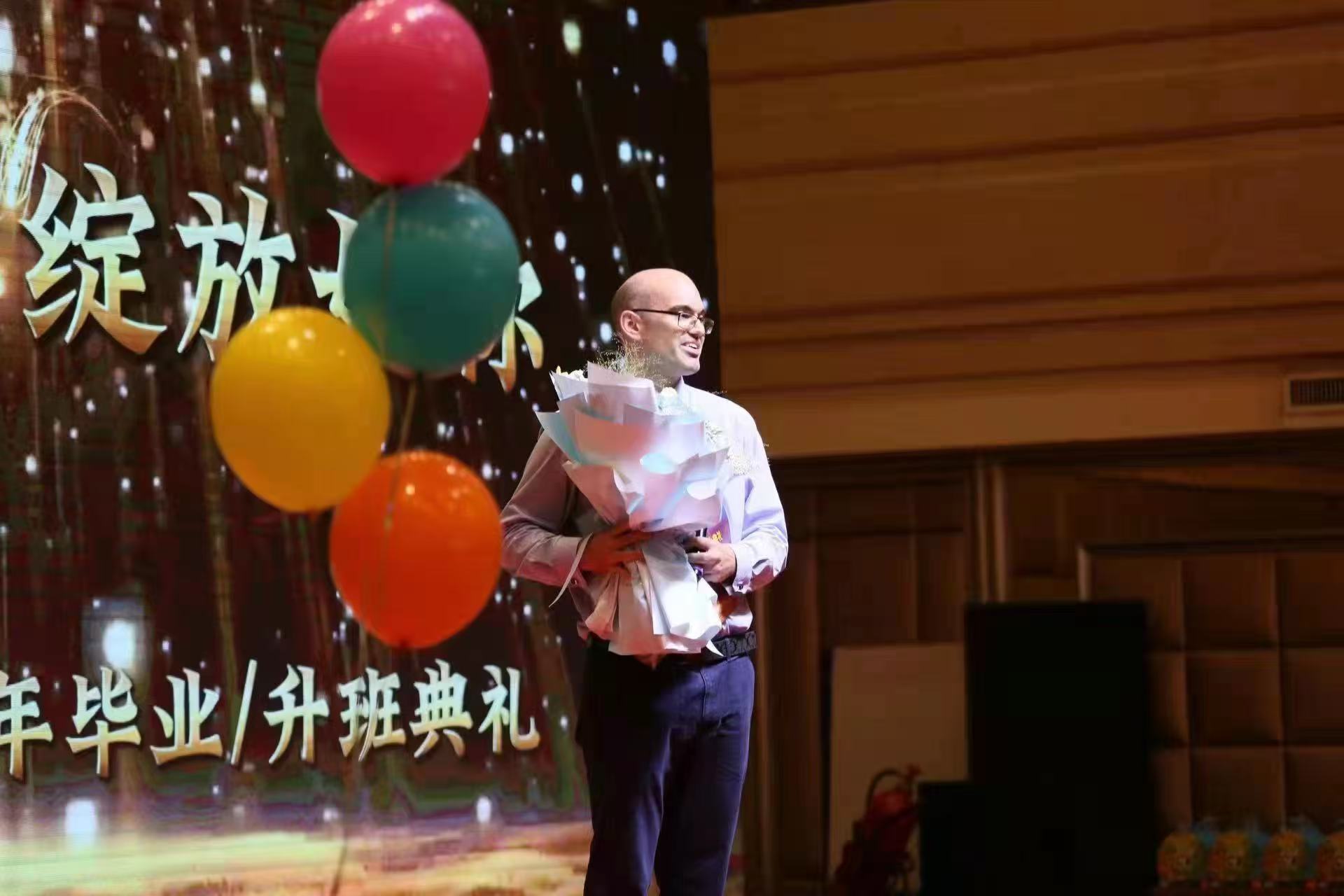
What were you doing before you moved to China to teach?
I’ve been teaching for about seven years – six of those in China. Before I started teaching, I was a project manager with the retailer, Lidl, but I was looking for a change. I was always inspired by my own teachers at school previously and I wanted a job that was more rewarding - that was giving something back.
I think all teachers need to find some inspiration and they find it often from their previous teachers. We can all remember teachers at school who inspired us in one way or another. Now, being a teacher myself, I look to do the same with my students. To inspire future generations, that’s what’s very rewarding about being a teacher.
When, where and why did you move to China to teach?
I first moved to China on a long-term basis in February 2018. I had previously spent short term periods working in schools as part of various exchange projects. I moved to the province of Liaoning, which is in the North-East of China. It’s around three hours on the ultra-high-speed train from Beijing, or a one-hour flight. I had been looking to take up a position in China on a permanent basis and at that time it felt like the ideal opportunity. I had just turned 30 and held a decent position in the UK, but I wanted a career change and the opportunity to go back to China, which is something that had always been in the back of my mind since my initial visits there as an exchange student some 10 years earlier.
My first position was in a Training Centre. I was teaching children aged between 3-10 years old, playing games and mostly introducing them to English in an informal and entertaining setting.
Can you remember when you first moved to China to teach - what was it like? How did you adapt?
The school was very different to what I expected it to be, and I had to quickly manage expectations and understand cultural differences. I think when someone enters a new culture, it is always important to be culturally sensitive and aware of different expectations. For many parents, they just wanted their children to enjoy the class and were less focused on anything that was too intellectually challenging for their children.
Socially I had previously been to China, so the culture shock around language, food and general way of life was not too dissimilar to what I had previously encountered. I think it’s important to find friends and people you can trust when you are working and living in a foreign setting like that. Having a skill or a hobby or a sport that you are passionate about can really help keep you motivated and lets you meet like-minded people. For me, this was running, and I was quickly able to enter local races and meet new friends at local running tracks.
What are your top 3 favourite things about teaching in China?
- Enthusiastic students.
- The ability to really add value to the classroom as a native speaker and offer something new and fresh for the students.
- Salary - One has to be honest; it’s one of the highest paying ESL countries to work in with a low cost and relatively high standard of living.
Any drawbacks?
Sometimes things don’t go as you planned or don’t work out necessarily in the way you had hoped. You have to be very adaptable and always culturally aware and sensitive.
The language is incredibly difficult to learn, but I think if you try hard and try to pick up as much as you can from the outset, it is very beneficial.
It can be a lonely existence at times as well. It is very far from home and whilst most foreigners carve out their own way of life, the cultural differences and occasional misunderstandings can start to wear you down somewhat emotionally.
Any advice to others thinking about moving to China to teach?
You’re currently studying the online PGCE without QTS course with ARU. What motivated you to undertake the PGCE?
The big motivation to do the PGCE with ARU was to further enhance my career. I think also I had hit a crossroads in my career where I needed that little bit of an additional academic learning to help support me in the classroom. I have a TEFL certificate which has been very useful and taught me certain skills, but I wanted to go back and look in more detail through study and gain the PGCE.
I was seeing colleagues - those that had the PGCE - I could see a tangible difference in the way they could hold a class together and in their teaching style. I think that really inspired me to get the PGCE – to help me be a more rounded teacher. It gives me some new tools and equips me to be better around the students and help the students further.

How are you finding the course and studying online?
The reason for doing the PGCE online gave me the opportunity to combine working and studying at the same time, so I didn’t need to take a break from my career.
The course has been extremely flexible. There haven’t really been any issues around different time zones. The live tutorials took place to suit either the Asian time zone or to suit the western or American time zone. They’re all recorded so it allows to look at each module whenever you have the time available.
I was able to travel away during Chinese New Year. I missed two out of the six modules for the second part of the course, but it was very easy to pick that up. The course leaders knew that a lot of the students were based out in Asia, and having time off for Chinese New Year, so they delayed the start and moved a deadline.
You do have a community feel on the course. You can engage with other students who are in various other places, such as sharing ideas.
What are your future teaching ambitions? How does gaining the PGCE factor into that?
The PGCE is going to be highly beneficial to me in an international setting because it’s an internationally recognised award. It will be very useful for any future job prospects. It’s something a lot of the HR in China for the larger schools are looking for. Having that PGCE sets you out from other candidates so it will be beneficial to my career prospects.
Certainly, here in China, the visa requirements can often change so on a points-based system for visas the PGCE carries a lot of weight. It’s internationally regarded as the major qualification any teacher needs.
In the future I plan to move forward in my career. Move to larger schools and look for positions maybe outside of China – more global positions – the PGCE will be a great benefit.
Has the PGCE course helped your teaching practice?
At first I was a little bit sceptical. But a lot of the ideas, concepts, and theories that we have studied, has really helped me in the classroom. It helps me as a teacher to be more reflective about my practice. It’s given me a birds eye view of my classroom – what I do and the way in which I manage the classroom and manage my own teaching practice. The reading has given me fresh ideas, helped with issues like classroom management, behavioural management.
The course has been very impactful. It’s changed the way I approach my teaching and my lesson planning. It’s changed me as a person. It’s made me a more rounded teacher. It’s helped me become more adaptable to certain issues that might arise in any classroom setting.
What would you say to other teachers in China thinking about doing the PGCE?
Discover whether the PGCE without QTS course is right for you?
If, like Jonathan, you’re looking to enhance your teaching practice and gain a postgraduate qualification that could enhance your teaching career, then this course could be right for you. Learning through distance learning, means you can continue working and study at the same time. No need to take a career break or compromise your family commitments or hobbies.
Find out more about the PGCE without QTS here.
You may also be interested in our other online degrees in the Education sector and can find out more here.




